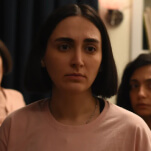
Director Mohammad Rasoulof has long criticized the Iranian government, to the point of being exiled from the country, often depicting the ways his theocratic rulers ensnare ordinary people in ethically compromised and isolated lives. His latest film, The Seed Of The Sacred Fig, shows how those compromises bear out in the home. Zeroing in on the feminist revolution that overtook Tehran in 2022, Rasoulof reveals how the pervasive restrictions of authoritarian regimes poison the family, turning parents into guards and children into potential sleeper cells awaiting activation.
The Seed Of The Sacred Fig starts small and expands. After 20 years of loyal service to the state government, Iman (Missagh Zareh) is promoted from lawyer to investigative judge, a risky career move that requires his wife Najmeh (Sohelia Golestani) and daughters, Rezvan (Mahsa Rostami) and Sana (Setareh Maleki), to live in secret for fear of doxxing and reprisals. Iman’s superiors issue him a gun for protection, and the family’s modest two-bedroom becomes a prison.
Rasoulof’s script carefully builds these conflicts and relationships, stacking complications upon contradictions, drawing a line through the small apartment between parents and children. Shortly after the family’s celebratory dinner, the realities of Iman’s job begin pushing against the lives his family wants to live. With political violence exploding throughout the country, the government forces Iman to perform express adjudication on a death penalty case. Then another. Then another. He soon realizes he wasn’t hired to investigate at all, just judge. As waves of protests consume the country, Iman finds himself buried under a mountain of judgments and guilt. Iman thought of himself as an honest, god-fearing lawyer. His sense of self slips away as he makes one concession after another.
Much of Seed Of The Sacred Fig takes place in the apartment, where Najmeh must enforce and embrace Iman’s new reality, isolating her daughters from the protests and their father’s fracturing psyche. She can only do so much. When Rezvan’s friend Sadaf (Niousha Akhshi) visits, the revolutionary spirit the girls have seen on television and social media takes human form, and so do the death sentences their father hands out. As Najmeh, Golestani plays the stonewalling mother with hesitancy and repressed compassion, clinging to the diminishing upsides of Imani’s job, such as a new apartment…that downgrades to a new dishwasher—maybe. When she grabs medical supplies to clean buckshot out of a young protester’s eye, Golestani shows us that she’s been making these trade-offs longer than we know, caring for the injured while forcing them back on their feet and out the door. Her position weakens the more she considers the differences between the dead protestors on the street and the daughters at her dinner table.
The first half of the film’s 168 minutes plays like a domestic drama baked inside a political thriller. With revolution outside their doors, Najmeh burrows the family deeper into the apartment, reinforcing the reality that state TV depicts. But when Iman’s pistol goes missing, a microcosm of the uprising explodes in the apartment. Suddenly, the government’s crosshairs turn on Iman. Losing a weapon is a jailable offense, and his mania reveals the depths of his paranoia.
The paranoia that consumes the family at the center of Seed Of The Sacred Fig is so overwhelming, in part, because Rasoulof and his cast have spent a lifetime surviving it. His 2013 thriller Manuscripts Don’t Burn features no credits other than Rasoulof. The actors and crewmembers go uncredited out of fear of government reprisal. In the years since, the filmmaker has been sentenced to jail and banned from making movies. Rasoulof remains a fugitive from the country, fleeing an eight-year prison sentence and a flogging for making Seed Of The Sacred Fig “without obtaining a license.” Golestani and Zareh are currently barred from leaving Iran because of the film.
Reality is never far from the edges of the frame. Screens, big and small, play a significant role in the film, serving information and misinformation equally. The television is a government mouthpiece, offering Najmeh talking points as to why a woman died in police custody. The girls get the real story from their phones, going through a VPN to see unrestricted and graphic footage of the protests. The footage is real, and so is the uprising spurred by the death of Mahsa Amini. She died in police custody in 2022 for allegedly not wearing a hijab. Throughout the film, editor Andrew Bird shares protest footage with the audience, inserting vertical video clips of protests and state-sanctioned violence and murder. We see what the girls see, reframing our perspective from the parents to the children.
Rasoulof mirrors the feminist revolution in the home, showing the progressive needs of society and the mundane ones of its citizens. As we see blurry smartphone footage of women around Tehran removing the hijab in protest, the girls push against restrictions of their own, asking the tailor to make a burka that’s a little more form-fitting. As they make concessions, the limits around them become more repressive. The harder the boot of fascism presses on Iman’s face, and the harder he presses on his family. When the gun goes missing, Iman’s family becomes a microcosm of the country. The women now have the means to defend themselves and fight for their freedom while sending Iman into a tailspin.
Eschewing the formal flare of his previous work, Rasoulof finds something more immediate here, a drama that burns like a political thriller and sears like a documentary. As the film speeds into its Hitchcockian finale and we wait for Chekov’s gun to fire, it finds a new unstable ground on the outskirts of society. The Seed Of The Sacred Fig grows into an epic of suspense, an unpredictable domestic thriller where the personal is always political.
Director: Mohammad Rasoulof
Writer: Mohammad Rasoulof
Starring: Missagh Zare, Soheila Golestani, Setareh Maleki, Mahsa Rostami
Release Date: November 27, 2024
